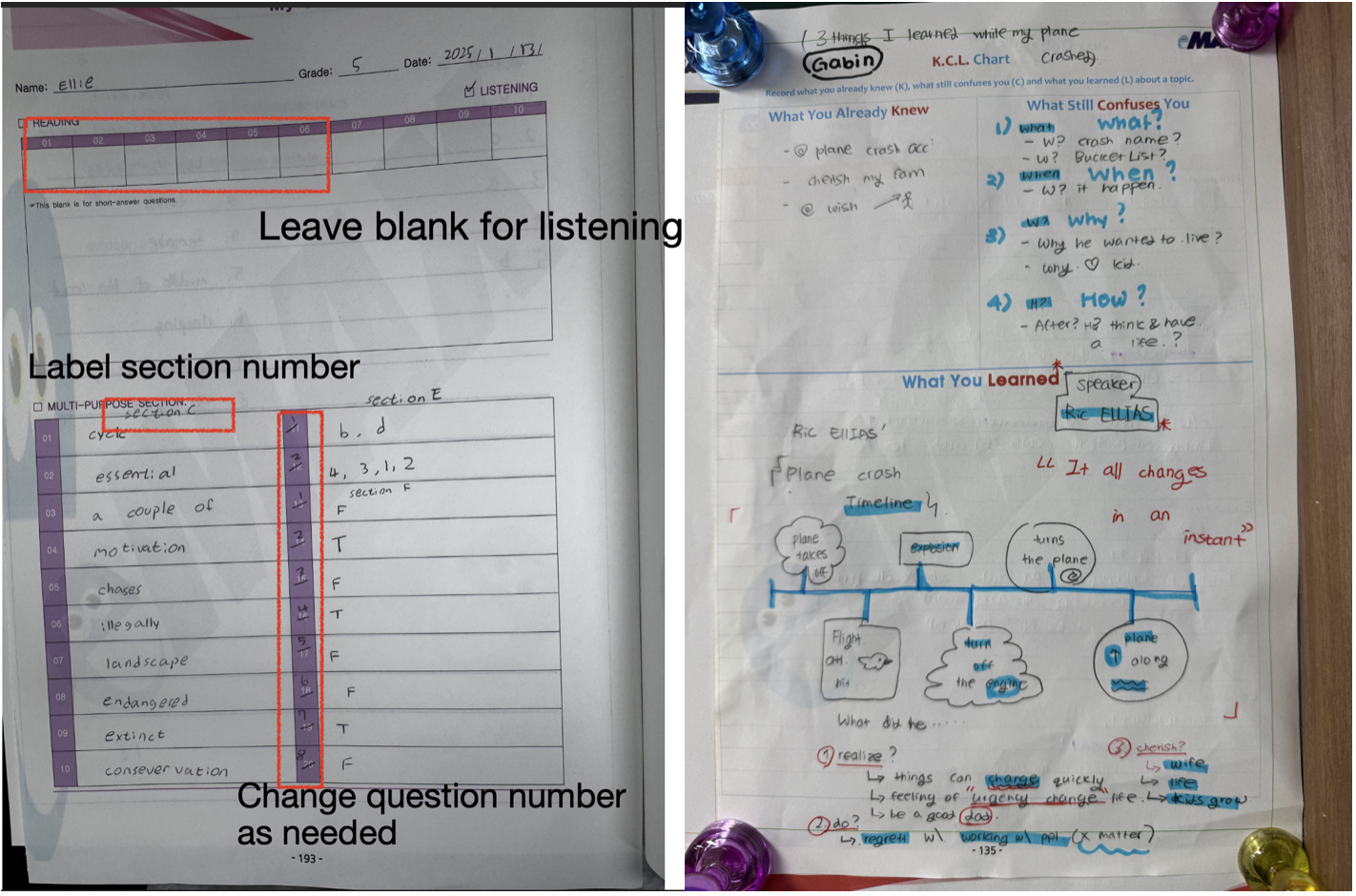General Guidelines
- Complete 1 section per day (3-4 sections total per homework)
- Target: 20 minutes per section, 60-80 minutes total
Why? Just like eating a big sandwich in small bites, doing homework bit by bit helps your brain digest better!
📝 IMPORTANT: Why Take Notes?
Taking notes is SUPER important because:
- It helps your brain remember - Writing = remembering better (like taking a photo with your hand AND brain!)
-
You'll use these notes in DEBATE CLASS - Your notes become your "evidence cards" to prove your points
Example: If debating about dolphins, your notes saying "dolphins use echolocation" becomes proof for why dolphins are smart!
- Good debaters always have evidence - No notes = no proof = weak argument!
Vocab Sections
Time: ~20 minutes per section
Step 1: Read & Mark (5 min)
- Highlight the most important sentence (main idea) in each paragraph
Example: If the paragraph is about dolphins, highlight "Dolphins are smart ocean animals that live in groups"
- Circle special words (keywords) that repeat or seem important
Example: Circle words like "pod", "echolocation", "marine mammals"
- Write a mini-summary:
- 1 sentence about the BIG idea
- 1-2 sentences with your circled words
Example: "Dolphins are intelligent marine mammals. They live in pods and use echolocation to find food."
Why? This helps you remember what you read AND gives you debate evidence!
Step 2: Answer Questions (10 min)
For definition questions:
- Look up the word in the dictionary
- The word might mean different things!
- Pick the meaning that makes sense in your sentence
Example: "bark" can mean 1) dog sound or 2) tree covering
For fill-in-the-blank questions:
- Check what type of word you need (noun, verb, adjective)
Example: "The ___ dog ran quickly" (you need an adjective like "brown" or "happy")
For word form questions:
- Google exactly like this: "word" "part of speech" form
Example: "run" "noun" form → gives you "runner" or "running"
Why? Learning different word forms helps you speak and write better English!
Step 3: Transfer Answers (5 min)
- Copy your answers neatly to the answer sheet
- Double-check you didn't skip any!
Why? Clean, organized work helps you avoid silly mistakes
Listening Sections
Time: ~20 minutes per section
Step 1: Quick Preview (3 min)
- Look at the questions first (like peeking at a treasure map!)
- Find out what information you need:
- Names? ("Who is speaking?")
- Numbers? ("How many cats does she have?")
- Reasons? ("Why did Tom go to the store?")
Example: If question asks "What time does the movie start?", you know to listen extra carefully for time words
Why? It's like knowing what treasures to look for before starting a treasure hunt!
Step 2: Listen Once (7-10 min)
- Play the audio and listen carefully for your "treasure" information from Step 1
- When you hear important stuff, quickly write it down
Example: You hear "The movie starts at 3:30" → write "3:30"
- DEBATE TIP: Also write down interesting facts you hear - these become your "power cards" in debates!
Example: You hear "70% of Earth is water" → write it down to use later!
- Try not to pause (in real life, people don't pause when they talk!)
Why? This trains your ears to catch important information for debates AND conversations!
Step 3: Answer & Review (7 min)
- First, try answering with your notes
- Only replay if you missed something specific
Example: If you missed the movie time, replay just that part
- Write answers directly on the sheet
Why? This teaches you to trust your listening skills and work efficiently
